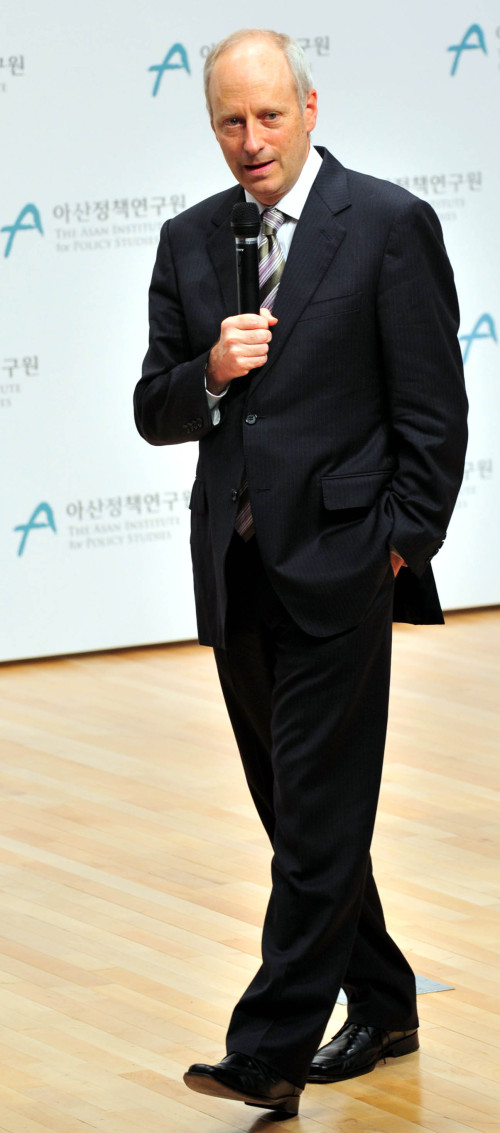On politics, people are usually somewhere in between the two opposites: effort and luck, free market and welfare state, libertarianism and egalitarianism and market values and non-market values. So what can strike a compromise between the two? Politics with common good and virtues of democracy, according to Harvard professor Michael J. Sandel.
On Thursday, the scholar and author of “Justice: What’s the Right Thing To Do?” gave a lecture on moral concerns underlying politics at the Asan Institute for Policy Studies in Seoul. Some of Korea’s leading politicians and scholars attended the event, including former GNP leader Chung Mong-joon and Choo Mi-ae, former lawmaker affiliated to the Democratic Party.
The Korean translation of “Justice” -- a book written based on Sandel‘s course at Harvard, where he has been teaching political philosophy for 30 years -- has sold 300,000 copies since its release in May.
Sandel started the lecture with his overview on current state of world politics. “The economics and all its success has crowded out politics,” he said.
“I think that there is a great hunger, yearning, among citizens generally, in my country and also in Korea, for politics of larger meaning that include moral and spiritual questions,” he added.
Addressing questions such as “Who ‘morally deserves’ to be admitted to Harvard?”, “Does Michael Jordan ‘morally deserve’ the wealth he has?” and “Is it right to pay low-income kids to read?” Sandel discussed the moral concept of “fair society” and “good society,” where goods are both properly distributed and evaluated.
On Thursday, the scholar and author of “Justice: What’s the Right Thing To Do?” gave a lecture on moral concerns underlying politics at the Asan Institute for Policy Studies in Seoul. Some of Korea’s leading politicians and scholars attended the event, including former GNP leader Chung Mong-joon and Choo Mi-ae, former lawmaker affiliated to the Democratic Party.
The Korean translation of “Justice” -- a book written based on Sandel‘s course at Harvard, where he has been teaching political philosophy for 30 years -- has sold 300,000 copies since its release in May.
Sandel started the lecture with his overview on current state of world politics. “The economics and all its success has crowded out politics,” he said.
“I think that there is a great hunger, yearning, among citizens generally, in my country and also in Korea, for politics of larger meaning that include moral and spiritual questions,” he added.
Addressing questions such as “Who ‘morally deserves’ to be admitted to Harvard?”, “Does Michael Jordan ‘morally deserve’ the wealth he has?” and “Is it right to pay low-income kids to read?” Sandel discussed the moral concept of “fair society” and “good society,” where goods are both properly distributed and evaluated.

And in the process of reaching that ideal society, what Sandel thinks is crucial is a receptive political climate that “demands more rather than less from one another as citizens,” following the very basics of democracy, and, most importantly, the common good.
“I think it’s more plausible to think that the virtues of democratic life -- community, solidarity, trust, civic friendship -- these values are not like commodities which are diminished with use,” said Sandel.
“They are more like muscles, which develop and grow stronger, with exercise,” he added.
During a question and answer period, Hwang Kyung-sig, professor of philosophy at Seoul National University, asked whether Sandel’s “communitarian” theory would be applicable to contemporary Korean society.
“You are generally considered a communitarian than a liberatarian,” said Hwang to Sandel. “But Korea has been deeply influenced by Confucianism, and as a result, we are in a condition where libertarian values -- one’s individual freedom and rights -- can be more appreciated. What kind of a meaning would your philosophy have in our current society?” Hwang asked.
Sandel, in return, said he is not always comfortable with the label “communitarian” and that the term can have different meanings and contexts depending on each and every society. “I am not in favor of the uncritical acceptance of tradition or authority or hierarchy,” Sandel said. “So to that extent I renounce the label of communitarian,” he added.
Singapore Embassador Chua Thai Keong, on the other hand, raised his concerns on the “cost” of democracy. Having every citizen engaged in politics can cause violent protests and clashes between classes, and unproductive discussions that don’t necessarily lead to an agreement, Chua said.
“In some ways, not knowing where the debate would end is something to fear,” Sandel told Chua.
“But I think that’s the definition of democracy.”
By Claire Lee (clairelee@heraldcorp.com)


![[AtoZ into Korean mind] Humor in Korea: Navigating the line between what's funny and not](http://res.heraldm.com/phpwas/restmb_idxmake.php?idx=644&simg=/content/image/2024/04/22/20240422050642_0.jpg&u=)


![[Herald Interview] Why Toss invited hackers to penetrate its system](http://res.heraldm.com/phpwas/restmb_idxmake.php?idx=644&simg=/content/image/2024/04/22/20240422050569_0.jpg&u=20240422150649)
![[Graphic News] 77% of young Koreans still financially dependent](http://res.heraldm.com/phpwas/restmb_idxmake.php?idx=644&simg=/content/image/2024/04/22/20240422050762_0.gif&u=)
![[Exclusive] Korean military set to ban iPhones over 'security' concerns](http://res.heraldm.com/phpwas/restmb_idxmake.php?idx=644&simg=/content/image/2024/04/23/20240423050599_0.jpg&u=20240423183955)






![[Exclusive] Korean military to ban iPhones over security issues](http://res.heraldm.com/phpwas/restmb_idxmake.php?idx=652&simg=/content/image/2024/04/23/20240423050599_0.jpg&u=20240423183955)



![[Today’s K-pop] Ateez confirms US tour details](http://res.heraldm.com/phpwas/restmb_idxmake.php?idx=642&simg=/content/image/2024/04/23/20240423050700_0.jpg&u=)